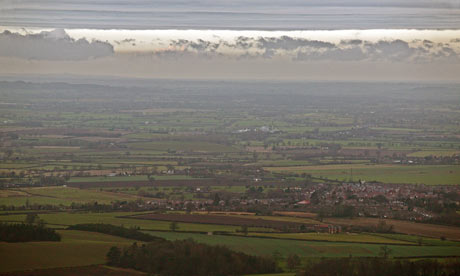
I'm no great fan of Thomas Hardy. I'm sure that plenty of readers of this blog will disagree, but for me his emotionally sodden landscapes and child-called-Sorrow plotlines make me want to simultaneously slit my throat and burst my sides laughing. I can never get rid of the feeling, either, that what most of his characters need is less a bit of luck than a hefty transfusion of backbone. All of which made me fearful when, in my last Virago Modern Classics book blog, Billy Mills highlighted the similarities between Hardy and my next Virago read: Mary Webb's 1924 bestseller, Precious Bane.
I can see what he means. It's not just Webb's eulogising of the Shropshire landscape, or the loving eye she casts over ye-oldey countryside traditions: love spinnings, sin eaters, fruity harvests, hoar frost on the windowpanes in winter … She also shares Hardy's weakness for melodramatic flourish: pale skinny women drift up rural lanes, characters commit desperate acts in bids to save their loved ones, remorseful men are besieged by (possibly literal, possibly figurative) ghosts.
Even the storyline of Precious Bane bears more than a passing resemblance to the Wessex chronicles. Set in the early 19th century, it tells of Prue Sarn, a woman born with a harelip (the eponymous "bane") and – worse – an avaricious brother called Gideon. Gideon, at the start of the novel, becomes a "sin eater" at the funeral of his father, taking on the sins of his father in return for ownership of the Sarn's home and farm. He does this despite protestations from his mother that "Sin Eaters be accurst!" By not listening to her, the die is cast – and for the rest of the narrative we get to watch as, in proper Henchard fashion, Gideon loses his humanity in his quest for money. He treats his mother and sister like farmyard machines ("we were all the machines he had"), and, amid tending to the corn and working like a mule, woos, then discards his childhood sweetheart, Jancis. She, in turn, acts in a way that would have made Sue Bridehead proud. "It was foreboded, Prue! It was to be. I've no home now, Prue, no home on all this earth," she says, before taking herself off to do something dreadful in the pond at the bottom of the farmyard.
What with this, sickly babies and dastardly doings with foxgloves, it's all too easy to see why Stella Gibbons, tired of the "large agonised faces in Mary Webb's books", took it upon herself to write Cold Comfort Farm. ("I did not believe," Gibbons later commented, "that people were any more despairing in Herefordshire than in Camden Town.")
And yet, having said all that – I loved Precious Bane. Yes, the novel is fatalistic. Yes, there's too much "loam and lovechild" storytelling. Yes, the narrator's choice of expression is sometimes unintentionally hilarious. (Prue's biblical exclamation "The maister have come!" – this being uttered whenever Kester, the weaver, appears – had the unfortunate effect of popping into my head whenever my own other half emerged from his study requesting tea, etc.)
Nonetheless, Precious Bane is well worth pursuing. For me, it's saved by two things:
First, there's Webb's dexterity with words. She's a marvellous writer – able, for instance, to take twee countryside details and turn them into something greater than their sum. So, that "little babe on its cot of rushes" on the first page is, three pages later, picked up again and expanded into a larger comment on human life: "We are all so helpless on the earth that is like a green rush cradle where mankind lies," Webb writes, "looking up at the stars, but not knowing what they be."
Second, the off-puttingly fatalistic bent of the book is lifted by Prue's story. Gideon may career towards a inevitably sticky end, but his downfall is pitted against the romance between Prue and Kester Woodseaves – the story of a marked girl finding love when she (and everyone else) thought she'd end up alone, and lonely. For Prue, that "bane" – the harelip that has marred her face and her self-esteem – has also, in setting her apart, developed the sweetness and forebearing that Kester comes to love.
And it's that sweetness and forebearing that sets the tone of the novel. Despite everything that happens, despite the looming disasters and the landscapes perpetually snagged in twilights and gloaming, Prue's sunny kindness is always there, shining through in the narration. That she finally triumphs, too, suggests to me that what Webb wants to tell us is that, yes, there might be suffering in life – but it's one aspect of it, not all of it.
For me, this was what lifted Precious Bane above any Hardy novel I've read. The commentary on life just seemed more rounded, more able to take in joy as well as pain (and able, too, to explore the relationship between the two states).
That I liked it more got me thinking, too – for the first time since I've started reading the VMC series – about why Hardy is firmly ensconced in the "canon" and Webb isn't. Is it about gender, or is there something I'm missing?
Next time: Stevie Smith's The Holiday.

